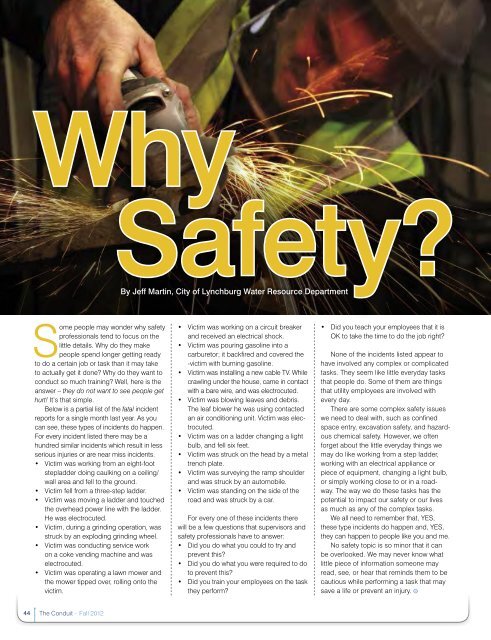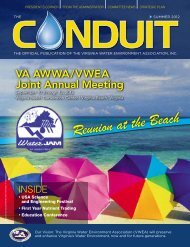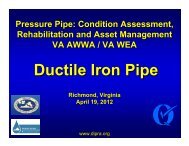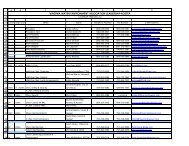bottled vs.tap: - Virginia Water Environment Association
bottled vs.tap: - Virginia Water Environment Association
bottled vs.tap: - Virginia Water Environment Association
- No tags were found...
You also want an ePaper? Increase the reach of your titles
YUMPU automatically turns print PDFs into web optimized ePapers that Google loves.
WhySafety?By Jeff Martin, City of Lynchburg <strong>Water</strong> Resource DepartmentSome people may wonder why safetyprofessionals tend to focus on thelittle details. Why do they makepeople spend longer getting readyto do a certain job or task than it may taketo actually get it done? Why do they want toconduct so much training? Well, here is theanswer – they do not want to see people gethurt! It’s that simple.Below is a partial list of the fatal incidentreports for a single month last year. As youcan see, these types of incidents do happen.For every incident listed there may be ahundred similar incidents which result in lessserious injuries or are near miss incidents.• Victim was working from an eight-footstepladder doing caulking on a ceiling/wall area and fell to the ground.• Victim fell from a three-step ladder.• Victim was moving a ladder and touchedthe overhead power line with the ladder.He was electrocuted.• Victim, during a grinding operation, wasstruck by an exploding grinding wheel.• Victim was conducting service workon a coke vending machine and waselectrocuted.• Victim was operating a lawn mower andthe mower tipped over, rolling onto thevictim.• Victim was working on a circuit breakerand received an electrical shock.• Victim was pouring gasoline into acarburetor; it backfired and covered the-victim with burning gasoline.• Victim was installing a new cable TV. Whilecrawling under the house, came in contactwith a bare wire, and was electrocuted.• Victim was blowing leaves and debris.The leaf blower he was using contactedan air conditioning unit. Victim was electrocuted.• Victim was on a ladder changing a lightbulb, and fell six feet.• Victim was struck on the head by a metaltrench plate.• Victim was surveying the ramp shoulderand was struck by an automobile.• Victim was standing on the side of theroad and was struck by a car.For every one of these incidents therewill be a few questions that supervisors andsafety professionals have to answer:• Did you do what you could to try andprevent this?• Did you do what you were required to doto prevent this?• Did you train your employees on the taskthey perform?• Did you teach your employees that it isOK to take the time to do the job right?None of the incidents listed appear tohave involved any complex or complicatedtasks. They seem like little everyday tasksthat people do. Some of them are thingsthat utility employees are involved withevery day.There are some complex safety issueswe need to deal with, such as confinedspace entry, excavation safety, and hazardouschemical safety. However, we oftenforget about the little everyday things wemay do like working from a step ladder,working with an electrical appliance orpiece of equipment, changing a light bulb,or simply working close to or in a roadway.The way we do these tasks has thepotential to impact our safety or our livesas much as any of the complex tasks.We all need to remember that, YES,these type incidents do happen and, YES,they can happen to people like you and me.No safety topic is so minor that it canbe overlooked. We may never know whatlittle piece of information someone mayread, see, or hear that reminds them to becautious while performing a task that maysave a life or prevent an injury.44 The Conduit – Fall 2012














